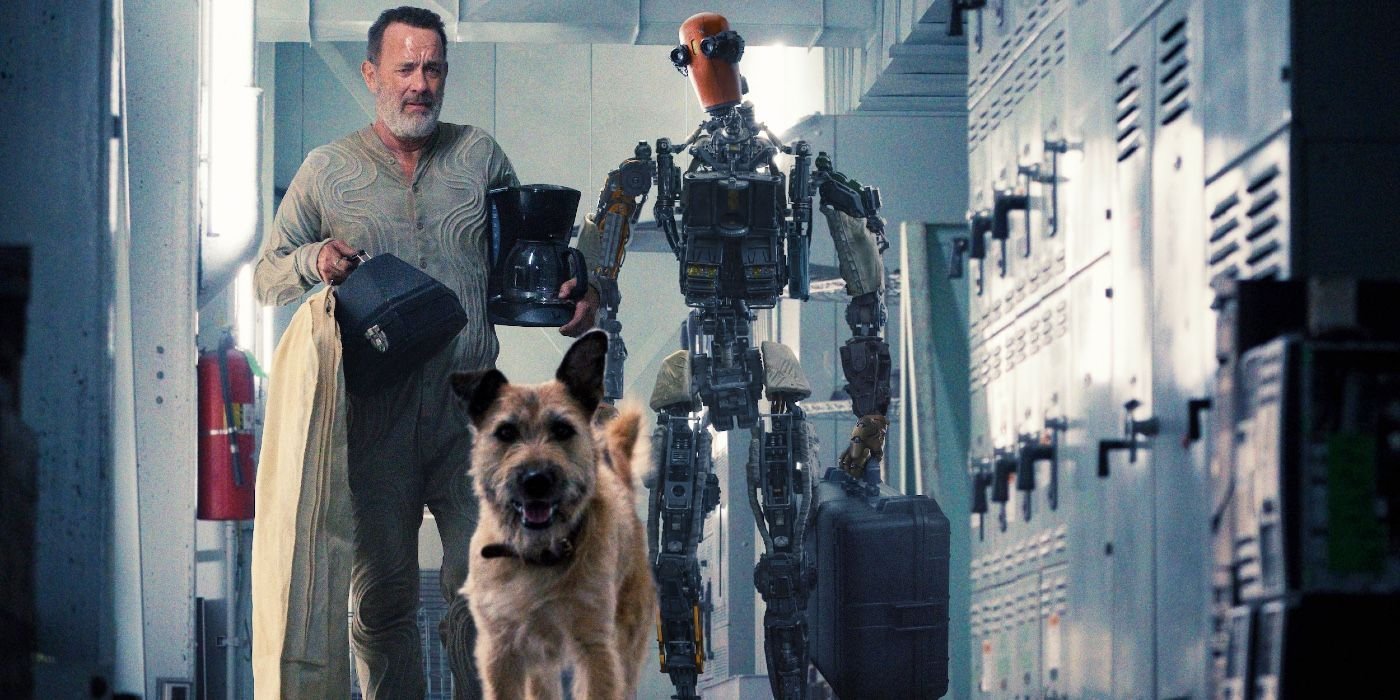FINCH
Directing: C+
Acting: B
Writing: C
Cinematography: B
Editing: C
Special Effects: B+
Finch has a compelling concept, which then gets squandered by a fatal mix of cutesiness and implausibility.
I was actually kind of enjoying it for a while, even as “Jeff,” the robot character created by Tom Hanks’s title character, evolves to become more “human” in ways that make less sense as time goes on. I kept wondering about anyone watching with even slight scientific knowledge (which, by and large, I do not have). I can easily imagine such people pulling their hair out in frustration. People who don’t mind, those who take this movie as simple escapism, either have no critical thinking skills or are happy to turn them off completely. More power to them, I guess.
The premise of a post-apocalyptic world ravaged by a massive solar flare that destroyed the ozone layer is plausible enough, I suppose, although I presume this movie gets pretty ridiculous the more details it gets into even with that—I don’t have any idea how it could be that cities like St. Louis and Denver are roasted and dead shells of what they once were, but the air around San Francisco and the Bay Area is somehow just fine.
What gets me more is the very concept of “Jeff” himself, basically a self-teaching android, whose very existence is never fully explained. When we meet Finch, he’s scavenging St. Louis with another robot creation that serves to place valuable items into its body basket with an extended robotic arm. He hasn’t even finished creating “Jeff” yet, and it’s never clear how Finch is smart enough to create an android but not smart enough to head west any earlier than this, when random weather systems threaten to destroy the laboratory he lives in and was once his place of work. Doing what, exactly, I don’t have any idea. The place doesn’t seem like a robotics lab, but that’s evidently what Finch has turned it into.
Jeff, as voiced by Caleb Landry Jones, is a vaguely humanoid robot that evokes memories of similar robots in earlier, superior films. He’s like a cross between the metal skeleton of The Terminator and Johnny 5 from Short Circuit. His voice is robotic in a way that recalls Stephen Hawking, and evolves over time to become “more human” until he sounds like a naive dipshit. In the film’s latter half, when my patience with it increasingly ran out, Jeff does narratively pointless things like give Finch a hug even though he can’t physically feel anything, or move his shoulders up and down as though he’s breathing—like, what? It’s not like Jeff is a replicant, as in the Blade Runner movies; he’s literally a walking collection of metal parts. I had a really hard time getting past this stuff.
To be certain, Finch would be a far worse film without the presence of Tom Hanks, who spends more time onscreen without any other human present than in any other movie since Cast Away (again, a far superior movie). Even at 65, Hanks remains a bona fide movie star, among the last of a dying breed, a man with such charisma and screen presence that he truly elevates anything he’s in. I was happily suspending my disbelief for a good two thirds of the movie thanks to Hanks’s performance alone. And even this is far from his best performance. But, he’s basically the only human face we ever see in the movie, with the very brief exception of a little girl in a flashback sequence. That flashback features one other grown man and one other grown woman, and neither of their faces are seen.
Finch is also fairly impressively rendered, on a visual and technical level. I can’t find any information as to its budget, but it looks like a movie that made the most of its limitations. I just wish the same had been done with its script, which clearly expects us to fall in love with this robot that exists to be heartwarming even though he was created by a terminally ill character who is dying from the effects of an extinction level global event. Why does this story need such a deeply incongruous, devastating framework? Finch creates Jeff with the sole purpose of leaving something behind to care for his dog. How sweet, right? I guess, if you’re okay with also seeing Tom Hanks cough blood all over himself.
This was Tom Hanks’s second movie to release straight to Apple TV+. The first was last year’s Greyhound, which wasn’t great either but at least it was good. Still, this process is starting to feel like the twenties equivalent to “direct to video,” the movies that have some value but aren’t quite good enough for theatrical release. Given its limited amount of content, Apple’s fledgling streaming service could stand to up its game a bit.
A great man and a couple of dummies.
Overall: C+

